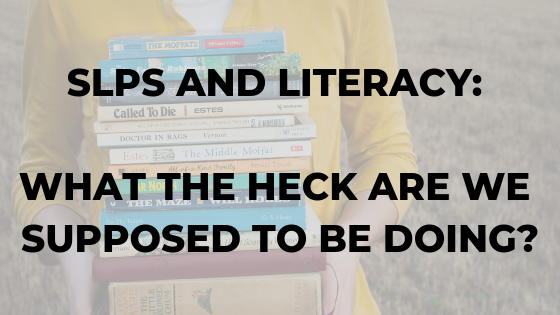Even though I don’t like to admit it, there were times throughout the early years of career that I’ve felt totally confused about my role in language and literacy.
If you have experienced this too, you know that feeling this way can make it really hard to do your job.
It wasn’t until I went back to get my doctorate that I started to put all the pieces together.
That’s why I want to bring some clarity to this issue we’ve all faced at one time or another.
If you’re reading this, you may know it’s pretty typical for SLPs to get referrals left and right for students who just aren’t making progress in reading.
You may also be starting to realize the students on your caseload can’t retain concepts across the board academically.
You probably have students who function poorly in the classroom because they can’t understand some of the vocabulary in academic tasks.
I’d guess that you really want to help all of these students and JUST DO YOUR JOB…but you’re so overwhelmed because you don’t know where to start.
You’ve probably already realized that there really isn’t a standard protocol for delivering language interventions.
Language is so complicated, and it’s difficult to find the root cause of these issues.
On top of that, even if we know what’s wrong, it seems impossible to address it in the little time you have with your students.
Over the course of my time as an SLP, I’ve had teachers come to me with referrals for students who couldn’t comprehend, couldn’t keep up with their peers in reading, and who were completely lost during classroom discussions.
Even though some of these students didn’t even qualify for any other special education support outside of what I was doing, they were falling way behind.
But eventually, I realized there was a common theme to these cases…and when I figured out what that was and how to address it…I finally started seeing results.
And here’s the thing that no one tells you when you decide to become an SLP:
Burn out, lack of respect (and decent pay), is NOT something you have to accept.
When you can actually step in to your role as an expert, you’ll be amazed at what opportunities start to open up.
For me, it was about finishing my doctorate and starting a business…and finally having time to share my language therapy research with other SLPs.
It all became possible when I found a framework that allowed me to be insanely effective without hours of planning…so I could finally own my expertise.
But the first step is understanding the components in that system that will define your role in language and literacy…
Which comes down to identifying that one key area where you should focus your therapy.
In this video, I share what that was and how to treat it efficiently and effectively in ways that are unique to your unique talents and skills as an SLP.
Plus, I’ll share a free printable download with you at the end to help get you started.
You can watch the video here:
Thank you for watching!
Click the button below to get the free printable Tier 2 Vocabulary download (includes 30 printable flashcards with 10 nouns, 10 adjectives, and 10 verbs) mentioned in the video.
For those of you who want to learn the first steps in creating an efficient, consistent language therapy protocol, check out my Vocabulary Foundation program.
When you join, you can:
✅Stop feeling like a “glorified tutor” who spends sessions drilling random vocabulary lists.
✅Stop running yourself ragged trying to teach your students everything.
✅Know where to get vocabulary targets for therapy (without spending hours planning).
✅Learn exactly how to differentiate your SLP role from the teachers’ and reading specialists’ jobs.
✅Start focusing your therapy on the academic vocabulary skills your students need to thrive in school, so they can reach their full potential in life.

